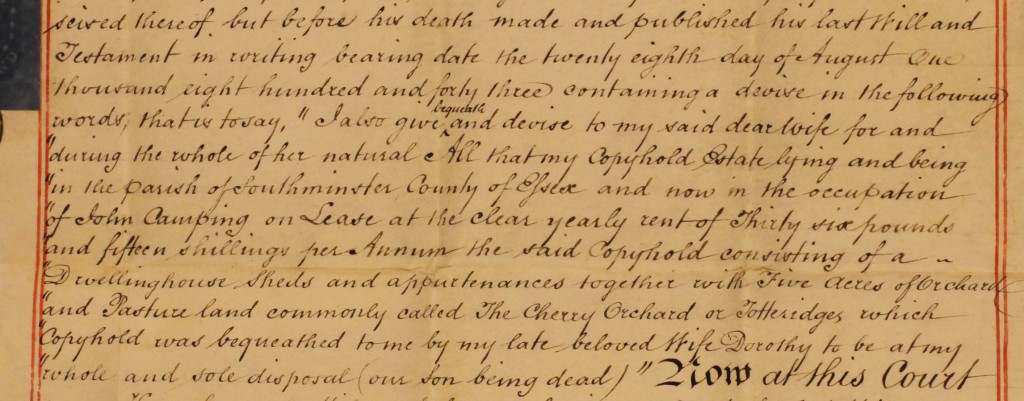Archives Assistant Edd Harris blogs for us about just a few of the things family historians can learn from property deeds…
Do you remember our friend Sargant Wilson? At the beginning of October we discovered his marriage licence which told us that in 1834 at the age of 60 he married Karenhappuch Morgan, ten years his junior. We have come across the couple again although unfortunately in less happy times.
This document is an admission onto copy hold land (D/DCf M73). This is a type of land holding used when land is part of a Manor. The people who hold land from the Manor are recorded in the Manor Court Roll along with any payments or rents that they are due to pay as well as a description of the land and its previous owners. The new landholders are then provided with a copy of that entry in the Court Roll, hence the name ‘copy hold’.
In the recitals of this particular example from Southminster in 1844 (ten years after his marriage) we are told that Sargant Wilson has died. The land that he held has been passed back (surrendered) to the Manor. The admission then goes on to say that Sargant Wilson left the land to his wife by his will which is quoted at length, describing the property and revealing that it was bequeathed to him by his former wife Dorothy and that he had a son who predeceased him. It goes on to admit his second wife Karenhappuch onto the land in his place and collects a fine or payment for doing this.
This just goes to show that family history can move far beyond the usual records of births, marriages and deaths. We now know that Sargant Wilson had a previous marriage to a Dorothy with whom he had a son, he had written a will, held land in the Manor of Southminster and we have a rough date for his death, all from one document.
You can search for deeds on Seax by the name of a person or property. Not all deeds are catalogued to this level of detail however, in which case manorial court rolls may be helpful. These records can be challenging, but as we have seen in the case of Sargant Wilson they can also be extremely rewarding, not only for family history but for house history and local history too. If you would like any further advice, then talk to ERO staff in the Searchroom, e-mail us on ero.enquiry@essex.gov.uk, or telephone 01234 244644.



